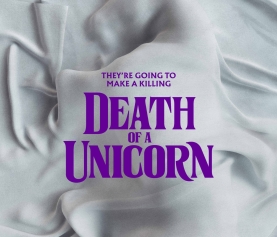
As the saying goes, Gloria Steinem is “having a moment.” The feminist icon, now 86, was portrayed with great distinction by the superb Rose Byrne in the FX/Hulu television miniseries MRS. AMERICA this past spring. Now, Steinem is given the big-screen treatment by not one but four actresses in filmmaker Julie Taymor’s THE GLORIAS. Gloria is rendered from grade school to modern-day and it says something about how big a deal Steinem is that it takes that many people to play her. Hers is a fascinating life of growth – physically, intellectually, spiritually – and Taymor tries to cover it all. Most of the time, THE GLORIAS (available digitally or via streaming exclusively online starting today at Amazon Prime) works quite well, but it could’ve done so even more.
For starters, divvying up the role four ways is a conceit that plays, given the expanse of decades, as well as the unorthodox jumping around in Gloria’s life in Taymor’s telling. Taymor employs other highly theatrical tropes throughout the film too, especially the one that places all of the various Gloria’s interacting with each other on a metaphorical bus together journeying through Steinem’s life. Those scenes give Alicia Vikander and Julianne Moore, both playing adult versions of Gloria, the opportunity to act together and comments on her life events. The events speak for themselves, and ultimately, all those scenes on the bus don’t add too much to the narrative. Instead, it mostly feels like schtick.
The events in Gloria’s life, particularly those she faced as a twentysomething writer struggling to find a journalistic home free of sexism, make for the best scenes in the film. She was recognized as a talented go-getter, yet chauvinist men still asked her to make coffee and meet them for hotel trysts in the middle of the afternoon. Vikander plays such scenes with palpable frustration and it’s the most accomplished work onscreen she’s done since her breakthrough in EX MACHINA in 2015.
Vikander also gets to play the most widely known landmarks from the Steinem biography including her employment as a Playboy bunny to her illegal abortion in the days before Roe v. Wade to her rising political activism. Her time onscreen gets to chart the greatest growth of the character’s arc, starting with her amusing travels with her eccentric father (Timothy Hutton, superb in a loosey-goosey part) all the way to the beginnings of Ms. magazine which Gloria co-founded.
The crackling dialogue between Vikander and Janelle Monae as fellow cofounder Dorothy Pittman Hughes (Janelle Monae) cements Gloria for the viewer, but not long after Vikander is replaced for the third act by Moore and it’s disappointing. Moore is formidable, as always, but she’s a colder and steelier Gloria, and one wonders why Vikander wasn’t allowed to play the whole thing with makeup to age her up where necessary.
By breaking Gloria into so many parts, it lessens the impact of her as a flesh and blood character onscreen and ends up turning her into more of a conceit. So too does Taymor’s decision to have her script, written with Sarah Ruhl, to cover some 70 years of Gloria’s life. The film begins with Gloria as a child (played by Ryan Kira Armstrong) and interweaves scenes with her as a pre-teen (Lulu Wilson) that give us snippets of a life, but don’t deepen it.
Some parts of Gloria’s life get the short shrift. More time is spent developing Bella Abzug (played hilariously by Bette Midler) than Gloria’s depressed mother (Enid Graham). We find out little about Gloria’s love life, even though much is made out of a broken engagement early on. And some of her activism after the creation of Ms. magazine feels rushed and even ignored. Granted, this isn’t a miniseries, but despite all of the clever ways of connecting the dots, Taymor still lets too much of it feel episodic.
THE GLORIAS ends up a fascinating and wholly worthy tribute, albeit one that bites off more than it can properly chew, and employing all kinds of cutting and movie-movie schtick to give it more pizazz than a standard biopic. Taymor means well and delivers a quality film, but it should’ve been less ornate and more substantive. The best biopics develop one or two formative incidents and dwell on them, rather than trying to tell 70 years in a little over two hours. Less is always more, and here, Moore is unfortunately less, especially after Vikander’s stunning connection with both the role and the best part of Gloria’s story.







